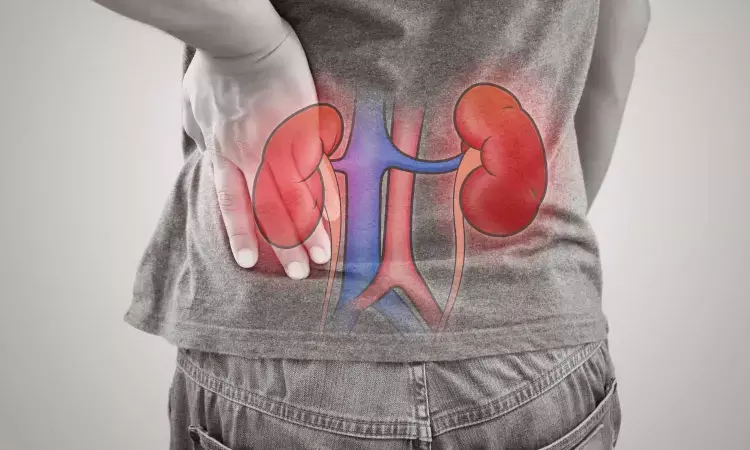- Home
- Medical news & Guidelines
- Anesthesiology
- Cardiology and CTVS
- Critical Care
- Dentistry
- Dermatology
- Diabetes and Endocrinology
- ENT
- Gastroenterology
- Medicine
- Nephrology
- Neurology
- Obstretics-Gynaecology
- Oncology
- Ophthalmology
- Orthopaedics
- Pediatrics-Neonatology
- Psychiatry
- Pulmonology
- Radiology
- Surgery
- Urology
- Laboratory Medicine
- Diet
- Nursing
- Paramedical
- Physiotherapy
- Health news
- Fact Check
- Bone Health Fact Check
- Brain Health Fact Check
- Cancer Related Fact Check
- Child Care Fact Check
- Dental and oral health fact check
- Diabetes and metabolic health fact check
- Diet and Nutrition Fact Check
- Eye and ENT Care Fact Check
- Fitness fact check
- Gut health fact check
- Heart health fact check
- Kidney health fact check
- Medical education fact check
- Men's health fact check
- Respiratory fact check
- Skin and hair care fact check
- Vaccine and Immunization fact check
- Women's health fact check
- AYUSH
- State News
- Andaman and Nicobar Islands
- Andhra Pradesh
- Arunachal Pradesh
- Assam
- Bihar
- Chandigarh
- Chattisgarh
- Dadra and Nagar Haveli
- Daman and Diu
- Delhi
- Goa
- Gujarat
- Haryana
- Himachal Pradesh
- Jammu & Kashmir
- Jharkhand
- Karnataka
- Kerala
- Ladakh
- Lakshadweep
- Madhya Pradesh
- Maharashtra
- Manipur
- Meghalaya
- Mizoram
- Nagaland
- Odisha
- Puducherry
- Punjab
- Rajasthan
- Sikkim
- Tamil Nadu
- Telangana
- Tripura
- Uttar Pradesh
- Uttrakhand
- West Bengal
- Medical Education
- Industry
Renal hyperfiltration associated with mortality regardless of diabetes status

Finland: A recent study published in the International Urology and Nephrology has established an association between renal hyperfiltration (RHF) and mortality risk independent of diabetes mellitus (DM).
The researchers suggest that regardless of the status of DM, renal hyperfiltration should be considered, managed, and followed up as a mortality-associated condition. They added clinicians should consider including RHF screening in routine clinical care, especially diabetic care.
Conventionally, diminished kidney function is linked to chronic kidney disease and elevated mortality risk. Renal hyperfiltration (RHF), or increased kidney function, has been largely dismissed as a normal observation in the general population and an expected manifestation of diabetes mellitus, where it precedes renal decline. The condition, devoid of clinical manifestations, remains unknown to general medicine and is primarily screened and managed within the context of diabetes mellitus.
Two recent studies conducted at the University of Eastern Finland and published in the International Urology and Nephrology journal (1,2) reveal that the harms of RHF might be highly underestimated, independent of diabetes mellitus. These studies emphasize the need to re-evaluate current RHF definitions and screening strategies to effectively reduce its impact on public health.
The first study (1) suggests that the optimal limit to define RHF may be much lower than previously thought. By analyzing the risk of early death associated with high kidney filtration rates in 1,187 non-diabetic middle-aged Finnish men, the researchers found that a lower kidney filtration rate threshold could serve as a more precise measure for defining RHF. This finding implies that the risk of early death related to RHF has been underestimated in the past. This conclusion aligns with a previous study (3), which found that up to 35% of Korean middle-aged men might be at increased mortality risk due to RHF.
The second study (2) investigated the role of diabetes mellitus in the relationship between RHF and mortality. Using a cohort of 2,682 Finnish men, the researchers demonstrated that RHF is associated with an increased mortality risk, irrespective of the effect of diabetes mellitus. This suggests that RHF should be acknowledged and considered as a mortality-associated condition, regardless of a patient's diabetes mellitus status.
Both studies were based on Kuopio Ischaemic Heart Disease Risk Factor Study data.
These two studies support evidence that RHF is a significant risk factor for early death and underscore the need to evaluate the potential benefits of integrating RHF screening into routine medical care, for both patients with and without diabetes. The authors call on the research community to further investigate RHF as an independent health condition and emphasize the need for a uniform and consensual definition of RHF, as higher-than-normal kidney function is not without consequences.
Lead author of the studies, Dr. Mounir Ould Setti, commented: "The burden of increased kidney filtration within what is still considered normal kidney function was highly underestimated. Our findings suggest that RHF should be considered a potential risk factor for mortality, and that we need a better understanding of its underlying mechanisms."
These two studies provide critical insights into the mortality risk of RHF, highlighting the need for further research into its diagnosis and, ultimately, the development of more effective interventions to reduce the mortality burden associated with this condition.
Reference:
Ould Setti M, Voutilainen A, Niskanen L, Tuomainen TP. The association between renal hyperfiltration and mortality is not mediated by diabetes mellitus. Int Urol Nephrol. 2023 Mar 23. doi: 10.1007/s11255-023-03562-9.
Dr Kamal Kant Kohli-MBBS, DTCD- a chest specialist with more than 30 years of practice and a flair for writing clinical articles, Dr Kamal Kant Kohli joined Medical Dialogues as a Chief Editor of Medical News. Besides writing articles, as an editor, he proofreads and verifies all the medical content published on Medical Dialogues including those coming from journals, studies,medical conferences,guidelines etc. Email: drkohli@medicaldialogues.in. Contact no. 011-43720751


